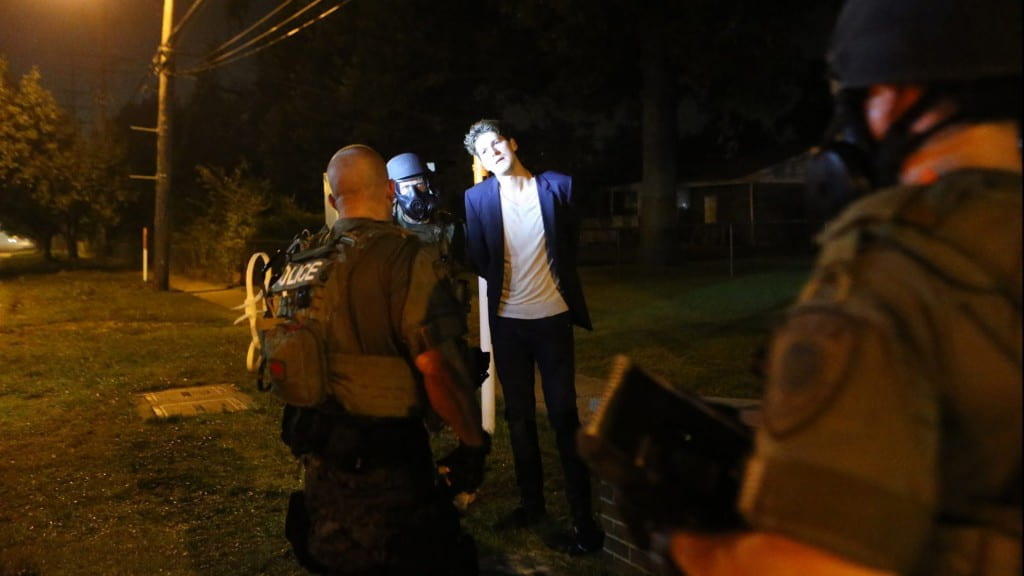 Visiting fellow Florian von Heintze, Deputy Editor-in-Chief of BILD, shared with CCLP the story of a BILD reporter who was wounded and arrested while covering the demonstrations in Ferguson, Missouri. Below is von Heintze’s personal introduction to the story:
Visiting fellow Florian von Heintze, Deputy Editor-in-Chief of BILD, shared with CCLP the story of a BILD reporter who was wounded and arrested while covering the demonstrations in Ferguson, Missouri. Below is von Heintze’s personal introduction to the story:
Three German reporters — among other American and international journalists — were arrested last night while covering the demonstrations in Ferguson, Missouri, following the fatal shooting of an unarmed black teenager by a white police officer. One of the journalists is 26-year-old Lukas Hermsmeier from Berlin, who writes for BILD, Europe’s largest selling newspaper with 12 million readers daily, and its website BILD.de with 14 million unique users and 300 million page impressions per month. Hermsmeier was wounded by rubber bullets and kept in jail for several hours. Here is what Julian Reichelt, Editor-in-chief of BILD.de, writes in his commentary in Wednesday’s printed and online edition of BILD about the incident. — Florian von Heintze
 BILD reporter Lukas Hermsmeier was arrested while covering the demonstrations in Ferguson, Missouri. (Photo: B.Z.)
BILD reporter Lukas Hermsmeier was arrested while covering the demonstrations in Ferguson, Missouri. (Photo: B.Z.)
Below is the commentary published today by Julian Reichelt, Editor-in-chief of BILD.de:
The freedom of the press is untouchable!
America is unmatched and unique. US presidents call their country, which stands for freedom more than any other, a “shining city upon a hill” and an “indispensable nation”.
The freedom of opinion. The freedom to demonstrate. The freedom of the press.
Such a nation, which leads the world as a role model, applies the highest standards. That is why the news from Ferguson is so disturbing.
Police that look like heavily armed soldiers during the war in Iraq, armoured Humvees, National Guard on duty, automatic weapons at the ready.
Add detained journalists, American and international, among them a reporter from BILD.
The US is a nation that denounces dictatorships seizing journalists.
The US is the fortress of the freedom of the press, home of <em>The New York Times</em> and the revelation of Watergate.
If there are journalists being detained and locked up in the US, the values of the West are shaking. President Obama has to clarify that the freedom (of the press) in the land of the free is untouchable!
Below is the article published today by Lukas Hermsmeier, the 26-year-old BILD reporter who was wounded and arrested by police while he was reporting in Ferguson, Missouri:
Freedom of the press, freedom of opinion, freedom of information and association. Our fundamental rights. Irrevocable. The western world is exemplary, especially the United States of America. The land of the free. The land of unlimited opportunities. At least in theory.
I have come to know the USA in praxis. Or at least that part of the truth that is the opposite of the savory theory.
On Monday evening I flew in from New York City to St. Louis to report from Ferguson for BILD, Europe’s best selling newspaper, and its website BILD.de. On August 9, the 18-year-old Michael Brown (who is black) was shot to death by a police officer (who is white) in Ferguson. Since then, Ferguson, Missouri has been in a state of emergency.
My evening in Ferguson started with a pen, a notebook and a smartphone in my hands. My night ended with bullet wounds, tear gas in my eyes and handcuffs in prison.
Protests on Monday evening started peacefully. Since around 8.30 pm, I was standing together with more than 100 other journalists on West Florissant Avenue. Occasionally, plastic bottles were thrown from demonstrators toward police officers lining the street. But the later it gets, the more aggressive the crowd becomes. The officers march toward the protesters, rifles at the ready. We ask ourselves: What kind of a tactic is this? What kind of symbolism? How can guns and rifles deescalate such a situation? Is this common in the USA? Then at around 11:00 pm, a fire lit up and police were spraying tear gas everywhere.
Yes, some of the protesters provoking. Yes, some throw things. Yes, the police have to react. The question is: how do they react?
At 1:00 am there are 30 screaming demonstrators facing the police. They are cursing at the cops but do not look really dangerous. No Molotov cocktails, no rocks. A colleague from New York and I are standing on the sidewalk. We take notes and pictures. We want to know how this night will end.
Suddenly two armored police trucks rush towards us, shooting with blinding grenades and tear gas. Coughing, we run into a side street, eyes red from the gas, and hide in a front yard for 15 long minutes.
Protesters or journalists. The police don’t see a difference anymore.
The huge trucks are lighting the streets. My colleague and I step out of the dark from behind a tree, hands up. We shout, “Journalists, Journalists!” and “Press, Press!” The police officers on the truck are waving us towards Main Street. They seem to know that we are just reporters and do not want to get into any trouble. But then we are facing a second truck, armed police officers standing in front of it. They ignore our shouts and risen hands.
Suddenly a first shot. We turn around and start to run. A rubber bullet hits my right hip, another one my right knee. My colleague is also hit. We both fall into the grass. They drag us up and put plastic handcuffs on, so tight my left wrist is numb after minutes. The bullet has ripped open my jeans. I am bleeding and feel a dull pain on my hip.
A police truck drives us to a collection. My wallet, smartphone, pen, belt and shoelaces are taken from me.
Dialogue with an officer:
Me: “My hand is numb.”
Officer: “Don’t worry, you won’t die from that.”
Me: “Why were we arrested?”
Officer: “You’ve broken the law.”
Me: “Which law?”
Officer: “We told you to clear the street.”
My colleague and I were not on the street. We were on the sidewalk. We did our job. And in the final situation we raised our hands. The officer doesn’t answer anymore.
We are taken into a vehicle in which some protesters are already locked in and driven to St. Louis County Jail. It is 2:00 am and I am sitting together with 14 young men in a white, sweat-stinking cell with benches, open toilet and water tap. Next, a friendly prison doctor is examining me. “You are the first one with wounds”, he says. We wait, wait, wait and then are led into a large room, with others in single cells.
First the mugshot, then fingerprints. Again we wait, wait, wait. After two hours, they give us white fluffy bread with salami. I try to make a call to Germany, but the phone doesn’t work. An officer with a huge tooth gap, beer belly and half-bald head shouts, “Twenty four hours under arrest is normal.”
In the meantime, my colleagues from BILD and the German consulate have called the prison administration. I notice the guards are talking about me. And they don’t hide it. There is a German journalist who just moved to New York ten days ago. “Welcome to America,” one of them says. The others are laughing. “He got a shot on his bum,” says another one, and again they are all laughing.
I have the feeling I am treated badly but still better than the other inmates, because I am a journalist and because I am white. While I am being searched only briefly, the black inmates are being checked thoroughly.
At 7:00 am my name is being called, and I am allowed to leave the jail.
I did not expect the USA to be a perfect paradise for freedom, without any fail or blame. But I also did not think that unarmed journalists, hands up in the air, would be shot at without any reason.
“Hands up, don’t shoot!” protesters in Ferguson have been shouting for days now. Michael Brown was supposed to be unarmed, holding his hands up when he was fatally shot. I had my hands up, too. But for me, it was just a round of rubber bullets. Lucky me.